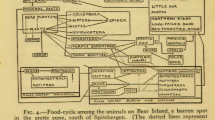Conclusion
With the rejection of group selectionist derivations of ecological phenomena so incisively given by George Williams in 1966,43 Nicholson's long-ignored messages met with acceptance. Species benefit became, explicitly, incidental. But the reorientation was not just about a point of ecological theory. It was more fundamentally about theoretical style, the element shared by Wynne-Edwards' work and the newer, evolutionary ecology. That current approach is well expressed in an already classic paper by the British plant ecologist John Harper: Ultimately all the discoveries of descriptive, production or population ecology must find their meaning in evolutionary phenomena... Evolutionary thinking concentrates attention on the behaviour of the individual and his descendants. If nothing in biology has meaning except in the light of evolution and if evolution is about individuals and their descendants — i.e. fitness — we should not expect to reach any depth of understanding from studies that are based at the level of the superindividual... What we see as the organised behaviour of systems is the result of the fate of individuals.44
The emphasis in this passage is on style of thinking more than on study matter. What is so different from earlier ecologists is the rejection of the superorganism and its associated baggage of selfimposed constraints in an end-oriented process, such as balance of nature or species-level adaptation.
The hallmark of post-1959 evolutionary ecology is the recognition, the making explicit of the question that the selective, genetical process of fitness (fates of genes) has to be separated from the observations of different levels of adaptiveness. An easy conflation of cause and result is no longer satisfying; now attempts to disentangle the complex strands tying population phenomena to the different levels of selection are providing the excitement of a new research program. In this program evolutionary theory is used to define the appropriate questions, as exemplified by the organization of the textbook Evolutionary Ecology.45 Our discussion of the invention of a new approach, with a characteristic style and set of interests, must also be about how the practitioners of ecology have perceived themselves. The early attempts of Poulton and Nicholson were not taken up by the vigorously growing science of ecology, which developed first - and intentionally — along a narrower, hierarchically restrained set of questions about population. The depth of Poulton's and Nicholson's submergence is indicated by the fact that even Wynne-Edwards did not argue in the manner of one rescuing a minor tradition. Rather, he thought he had a new approach, that of placing evolution in the foundations of ecology. Although this approach was not exactly original, we should be cautious in grouping all evolutionary concerns within ecology in one intellectual tradition. The particular style of selectionist deduction invigorated by Wynne-Edwards was successful only in the volatile situation of a rapidly growing discipline, full of self-critical examination and new rigor. Whereas in 1930 evolutionary concerns did not provide that rigor, by 1960 they could - and did.
Similar content being viewed by others
Author information
Authors and Affiliations
Rights and permissions
About this article
Cite this article
Kimler, W.C. Advantage, adaptiveness, and evolutionary ecology. J Hist Biol 19, 215–233 (1986). https://doi.org/10.1007/BF00138877
Issue Date:
DOI: https://doi.org/10.1007/BF00138877




